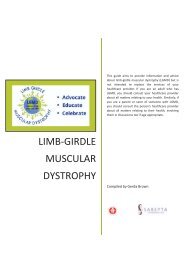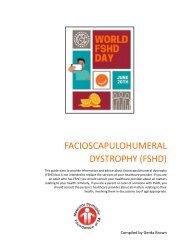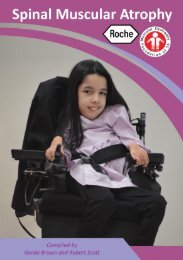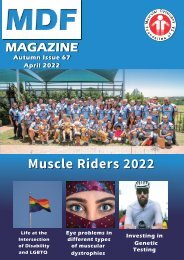MDF Magazine Issue 61 April 2020 (2)
Create successful ePaper yourself
Turn your PDF publications into a flip-book with our unique Google optimized e-Paper software.
Research
Potential DMD Treatment, ATL1102, Showing Safety and Muscle
Strength Gain in Phase 2 Trial By Joana Carvalho
The experimental therapy ATL1102 is safe and continues
to show evidence of improved upper muscle strength and
function in all nine non-ambulatory boys with Duchenne
muscular dystrophy (DMD) in a nearly complete Phase 2
trial in Australia, updated data show.
Final results from the open-label study, testing ATL1102 at
low dose, is expected in early 2020. A potentially pivotal and
yearlong Phase 2b trial may follow.
ATL1102, developed by Antisense Therapeutics, is an
antisense inhibitor of CD49d, a subunit of the Very Late
Antigen-4 (VLA-4) receptor found on the surface of
immune T-cells.
By blocking this receptor, ATL1102 works to reduce the
number of T-cells producing high amounts of CD49d, which
have been linked to rapid and severe progression among
those with DMD. Lowering CD49d levels is also expected
to reduce tissue inflammation that exacerbates muscle fiber
damage, slow disease progression, and potentially improve
patients’ motor function and walking ability [sic].
The safety and tolerability of ATL1102 are being investigated
in a Phase 2 trial (ACTRN12618000970246) taking place
at the Royal Children’s Hospital (RCH) in Melbourne. The
study enrolled nine Duchenne boys, ages 10–18, all unable
to walk without assistance.
Its main goal is to evaluate the safety and tolerability of
ATL1102 given once weekly by subcutaneous (under-theskin)
injection at a dose of 25 mg for 24 weeks (six months).
Additional goals include assessing its effects on functional
capacity, upper limb strength, and on the levels of immune
cells in the blood.
Functional capacity is being evaluated using the Performance
of Upper Limb Test (PUL2.0), and upper limb strength by
the MyoGrip and MyoPinch tests.
Originally published online by
Muscular Dystrophy News Today
18 December 2019
Previous findings from the first six boys treated with
ATL1102 showed that the therapy was safe and well-tolerated.
Treatment also led to improvements in upper limb
muscle strength compared to a group of untreated children
in a previous study.
This update covers treatment given all nine boys, supporting
the safety of ATL1102 at the 25 mg low dose. The last two
patients are expected to finish being monitored in January,
Antisense said in a press release.
To date, the most common adverse events are related to its
subcutaneous administration, including injection site erythema
(redness) and skin discoloration. No one withdrew from
the study.
No serious adverse events have been recorded, and no
safety concerns were reported by the trial’s Data Safety
Monitoring Board.
PUL2.0 scores increased or remained stable in seven of
the nine boys over the course of the trial, suggesting an
overall improvement in functional capacity. MyoGrip and
MyoPinch tests also showed a clear improvement in
upper limb strength among children treated with ATL1102
compared to untreated boys.
“Seeing the efficacy signals of this study,
conducted with a low dose in a small number of boys over a
relatively short time period, is both gratifying and immensely
encouraging,” William Goolsbee, Antisense’s non-executive
director and chairman of the trial’s Scientific Advisory
Board, said in a press release. “[O]nly a small handful of drugs
have shown indications of efficacy so early in development.
In the context of DMD, we now look to have a drug,”
Goolsbee added. Treatment also reduced the
number of T-cells in the blood, including those
producing large amounts of CD49d, from baseline
(study’s start) to the end of treatment. These levels were
seen to rise again at week 28, after treatment stopped.
26


















